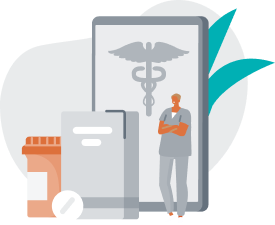Leveraging The 340B Program to Help Communities
The primary concern of community health centers and other healthcare providers is to ensure their current patients have positive outcomes. But what if there was a way to help patients who face barriers in accessing ongoing treatments that are financially out of reach? Luckily, there is.
The 340B Drug Pricing Program allows eligible healthcare organizations to access outpatient medications at significantly reduced prices, helping them stretch limited resources, expand services, and improve care delivery.
For infusion and specialty providers, this program may be a critical financial tool, supporting operational sustainability while broadening access for patients to high-cost therapies while navigating pharmacy affairs.
The Health Resources and Services Administration (HRSA) sets the criteria and includes certain hospitals, federally funded clinics, contracted pharmacies, and grantees of public health programs.
With proper compliance and strategy, the 340B program offers more than just drug discounts—it creates opportunities for organizational growth, reinvestment, and stronger patient outcomes.
Understanding the 340B Drug Pricing Program
The 340B Drug Pricing Program is a critical federal initiative that allows eligible healthcare organizations—referred to as covered entities—to purchase outpatient medications at significantly reduced prices.
Established under Section 340B of the Public Health Service Act, the program was created to support safety-net providers and strengthen access to care in underserved communities.
What Is the 340B Program?
The 340B program requires pharmaceutical manufacturers participating in Medicaid to sell outpatient drugs to eligible entities such as community health centers at discounted rates—often 25–50% below wholesale acquisition cost. These cost savings are intended to help providers extend services, maintain operational sustainability, and reinvest in patient-centered care initiatives.
For specialty infusion partners like CSP, the program creates a strategic opportunity: managing high-cost therapies more efficiently, supporting continuity of care, and empowering partners and contracted pharmacies to serve their communities.
Why the Program Exists
At its core, the 340B program is designed to strengthen the healthcare delivery infrastructure for vulnerable populations, including those facing socioeconomic challenges (low-income patients) or those living in remote areas.
By reducing drug acquisition costs, 340B covered entities may allocate savings toward expanded services, including infusions and complex specialty drugs, access initiatives, and clinical support programs.
For hospitals, health systems, and infusion providers, 340B pricing is more than a cost-containment tool—it’s a springboard for care innovation, improved outcomes, and long-term sustainability.
Who Qualifies For The 340B Program Among Providers?
Participation of healthcare organizations in the 340B Drug Pricing Program requires more than meeting baseline qualifications—it signals a provider’s commitment to supporting underserved communities and optimizing limited resources. Eligibility for those who provide health care services is governed by the Health Resources and Services Administration (HRSA), which ensures that only qualified healthcare organizations participate.
Covered Entities Under the Public Health Service Act
The Public Health Service Act outlines which healthcare organizations are eligible for 340B participation. These organizations include:
- Disproportionate share hospitals (DSH)
- Children’s hospitals and free standing cancer hospitals
- Critical access hospitals
- Sole community hospitals
- Rural referral centers
- Federally Qualified Health Centers (FQHCs) and look-alikes
- Some community health centers
To participate, eligible facilities must demonstrate they serve a high proportion of low-income, uninsured, or underinsured patients. For specialty infusion programs, that means operating within clearly defined compliance parameters while maintaining the high standard of care required for complex therapies.
Federally Qualified Health Centers and Community-Based Providers
Federally Qualified Health Centers (FQHCs), along with other community-based providers, are central to delivering primary and preventive care in underserved areas.
These organizations receive federal funding under Section 330 of the Public Health Service Act and must meet strict requirements related to governance, scope of services, and patient demographics.
For infusion providers, collaboration with FQHCs presents a valuable opportunity to expand access for low income patients to specialty therapies at the community level. CSP supports these partnerships by delivering infusion expertise and operational infrastructure that aligns with both clinical standards and 340B compliance.
Critical Access and Disproportionate Share Hospitals
Rural hospitals, including Critical Access Hospitals (CAHs), Disproportionate Share Hospitals (DSHs), and Sole Community Hospitals, also qualify for 340B participation.
These facilities often operate with limited resources but provide essential services in areas where healthcare access is limited.
Eligible Specialty Clinics and Targeted Care Programs
Select federal grantees—including Ryan White HIV/AIDS clinics, STD and TB clinics, hemophilia treatment centers, free standing cancer hospitals, and others—also qualify as 340B covered entities. These organizations serve patient populations with highly specialized, ongoing care needs.
CSP supports these 340B program entities with integrated pharmacy solutions that prioritize regulatory alignment, continuity of care, and therapy-specific expertise. We understand the operational challenges of delivering high-touch infusion therapy and provide support and infrastructure to meet both clinical and compliance standards.
Covered Outpatient Drugs
The 340B program aims to obtain covered outpatient drugs, defined as FDA-approved prescription medications intended for self-administering or outpatient use.
For infusion providers, understanding how these drugs are procured, tracked, and utilized is key to maintaining compliance and optimizing 340B program value.
Purchasing Requirements
To qualify under 340B, drugs must be sourced from manufacturers that have signed a Pharmaceutical Pricing Agreement (PPA) with the Centers for Medicare & Medicaid Services (CMS).
This includes a wide range of therapies, from biologics and specialty medications to infusion treatments for chronic and complex conditions.
Covered entities must implement systems that ensure:
- Clear separation of 340B vs. non-340B inventory
- Dispensing only to eligible patients in accordance with HRSA guidelines
- Accurate, auditable documentation of all 340B transactions
- Prevention of duplicate discounts and diversion
Partnering with an accredited specialty pharmacy—such as California Specialty Pharmacy—may help streamline 340B program compliance. Our systems are designed to support:
- Real-time drug tracking and procurement workflows
- Integrated billing and reimbursement oversight
- Audit preparedness across multiple payor and manufacturer requirements
Leveraging 340B Savings
While the 340B program doesn’t mandate how savings must be used, covered entities often reinvest in initiatives that improve care quality and operational efficiency. For infusion providers, this may include:
- Expanding access to high-cost specialty therapies from drug manufacturers
- Expanding health services through clinical staffing
- Funding remote monitoring and in-home nursing support
- Strengthening financial sustainability in underserved or rural areas
Patient Eligibility
While healthcare organizations must meet defined criteria to participate in the 340B program, eligibility also applies at the patient level. Understanding these parameters is essential for ensuring compliance and maximizing program integrity.
What is an Eligible Patient?
An eligible 340B patient is someone who:
- Has an established relationship with the covered entity
- Receives health care services from that entity (such as children’s hospitals)
- Is treated within the provider’s official scope of care
Dispensing a medication alone does not qualify a patient. For eligibility, care must be actively managed by the covered entity. For example, patients receiving specialty infusion therapy at a covered entity’s ambulatory center typically meet these requirements, assuming other criteria are also satisfied.
Handling Complex Therapies
Specialty pharmacies are essential to the 340B ecosystem, especially when managing complex medications that require coordinated care, temperature-sensitive handling, or ongoing clinical oversight. They achieve this through:
- Rigorous compliance with 340B dispensing requirements
- Seamless integration of clinical support and therapy management
- Tailored solutions for high-cost medications used in infusion care
340B pricing extends across a wide range of therapies—from immunoglobulins and anti-inflammatory biologics to oncology and neurology drugs. CSP ensures these medications are delivered safely, efficiently, and in alignment with program guidelines, helping covered entities expand access without compromising financial sustainability.
Program Compliance and Responsibilities For Providers
Participation in the 340B program carries important compliance obligations. The covered entity retains responsibility to follow program requirements to maintain eligibility and avoid penalties.
Notifying Drug Manufacturers
A sometimes overlooked responsibility is informing drug manufacturers of 340B participation. Covered entities must register with HRSA and maintain up-to-date information in the 340B database, which manufacturers use to verify eligibility for discounted pricing with contracted pharmacies.
This notification is essential for transparency and to prevent duplicate discounts, ensuring that manufacturers correctly apply 340B pricing without overlapping Medicaid rebates or other discounts on the same drug.
Annual Recertification and Ongoing Eligibility
Maintaining 340B status requires annual recertification. Covered entities must:
- Confirm continued compliance with eligibility criteria
- Review patient mix and service data
- Update registration details and affiliated sites
For healthcare providers delivering complex infusion therapies, ongoing compliance demands detailed oversight at contracted pharmacies.
Helping Patients Through Access to Affordable Medications
The question is not only who qualifies for 340B program, but how healthcare organizations like yours can serve vulnerable populations. By offering discounted drug pricing, it empowers covered entities to extend limited resources and expand vital services.
For patients requiring specialty infusion therapies, 340B can be the difference between access and cost-driven treatment gaps.
Looking for a specialty infusion partner who understands the complexities of the 340B program and can help you maximize its benefits while ensuring compliance? Connect with us today to explore how our collaborative approach may enhance your infusion services through 340B program protocols.
Frequently Asked Questions (FAQ):
How does the 340B pharmacy program work for organizations?
Covered entities in the 340B program purchase outpatient drugs at discounted prices, allowing them to stretch federal resources and serve a larger patient population.
How do patients get access to the 340B Program?
Patients gain access through healthcare services provided by organizations participating in the 340B program, such as hospitals and clinics that qualify as covered entities.
What are the rules of the 340B Program?
Covered entities must meet strict criteria, including serving a significant low-income patient base and ensuring 340B drugs are dispensed only to eligible patients.
What is the difference between Medicaid and 340B?
Both programs are safety net providers. However, 340B does not stretch limited federal resources. Medicaid provides healthcare coverage to low-income individuals, while the 340B program offers discounted drug pricing to eligible healthcare facilities to support care for underserved populations.
References:
340B Eligibility. Health Resources & Services Administration. 2024 Jun. https://www.hrsa.gov/opa/eligibility-and-registration
Criteria For Hospital Participation In The 340B Drug Discount Program. 340B Health. https://www.340bhealth.org/members/340b-program/criteria-for-hospital-participation/
Federal Grant Funding. National Association of Community Health Centers.
https://www.nachc.org/policy-advocacy/health-center-funding/federal-grant-funding/
Legal Disclaimer:
The content provided on this blog is for informational purposes only and is not intended to serve as medical advice, diagnosis, or treatment. While we make every effort to provide accurate and up-to-date information, the details shared here should not be considered a substitute for professional medical consultation or advice.
By accessing this blog, you agree to hold harmless the author, publisher, and any associated parties from any claims, liabilities, or damages arising from the use or interpretation of this content.
©2025 California Specialty Pharmacy, LLC. All rights reserved.

